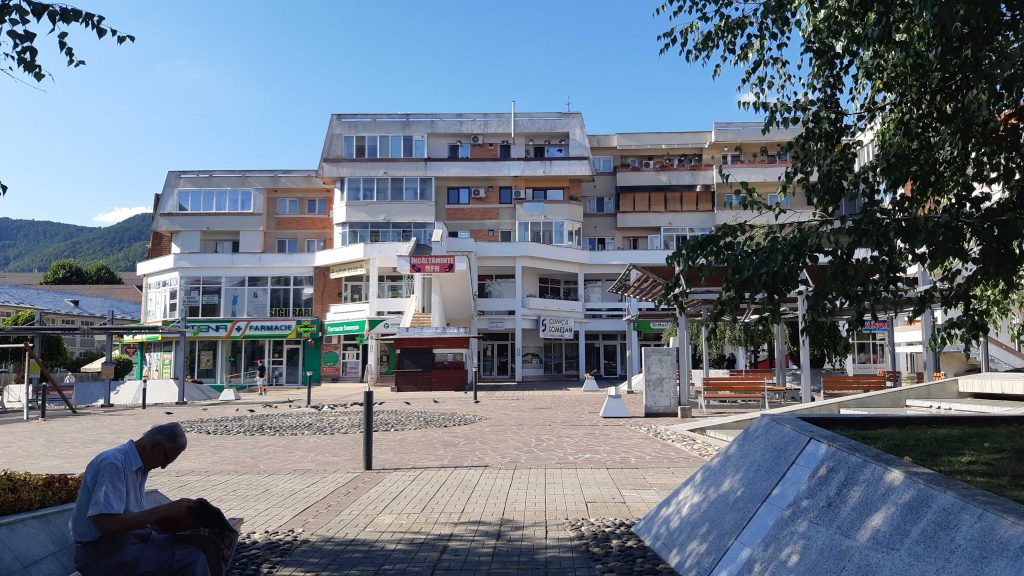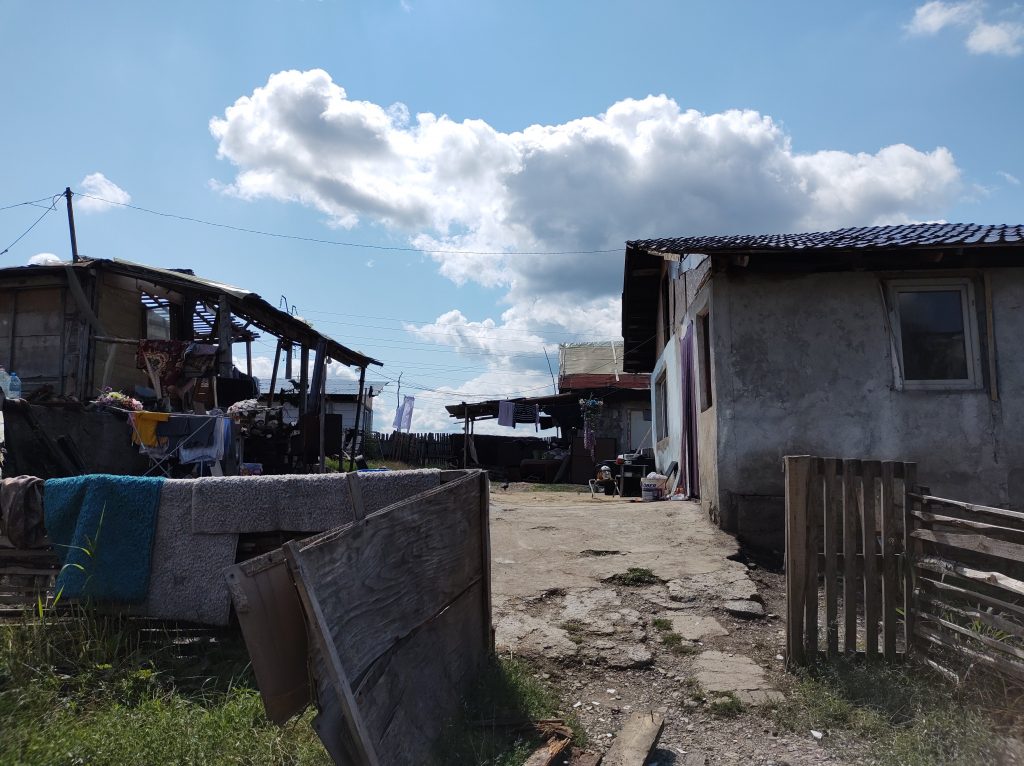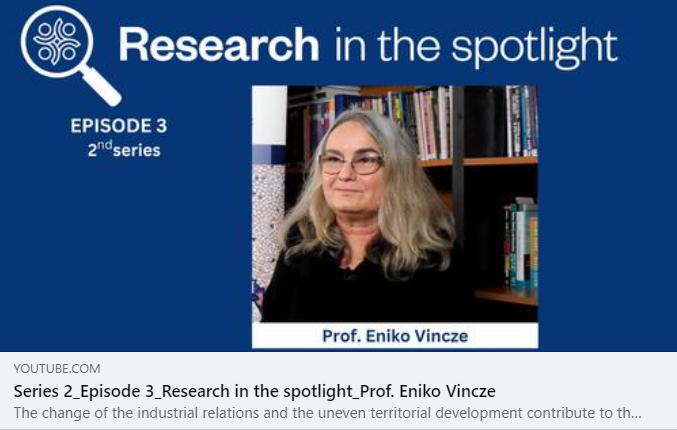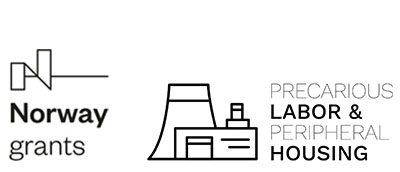Presenting the project
In this podcast, the team members present the assumptions that led to the creation of this project and its structure into a variety of sub-fields which put together, will provide a thorough analysis of the working and living conditions affected by industrialization and of the population in the concerned area.
Habitation. How to live in a former mining town
a podcast by Maria Martelli

Research project “Precarious work and peripheral housing. The socio-economic practices of the Roma in Romania in the context of industrial relations and uneven territorial development”, in short, PECWORK, looks at the great economic, political and social processes that create the living conditions in which people live their daily lives. The research is focused on Baia Mare, a city with a mining industrial past, which went through deindustrialization after the collapse of socialism, but also knowing a tendency to reindustrialize in the context of neoliberal capitalism. The multidisciplinary team at Babeş-Bolyai University, in collaboration with the FAFO Institute in Norway, with the financial support of the Norwegian and UEFISCDI grants in Romania, looks at the experiences experienced in work, housing and migration in a local context embedded in the great global transformations.
Maria Martelli: In today’s episode, we will focus more on the housing issue, as it relates to industrial relations and uneven development in the city of Baia Mare. Alongside me I have Enikő Vincze, project director and coordinator of the research package on unequal development and housing. She is a professor at Babeş-Bolyai University and an activist within the movement Căși Sociale Acum! from Cluj. Throughout her academic career, Enikő’s research and publications focused on nationalism and identity policies, gender relations and feminism, social-territorial marginalization of Roma and racism, urban development and housing, real estate development and the formation of capitalism in Romania.
Life in an informal settlement at the outskirts of Baia Mare
a podcast with Hestia Delibas

Interviewer: Hello dear listeners. We are very honored to introduce to you to a series of interviews with the researchers of the Project: Precarious labor and peripheral housing. The socio-economic practices of Romanian Roma in the context of changing industrial relations and uneven territorial development. They are going to talk briefly about their fieldwork, their experience as researchers and their findings. If you are interested in the many social issues we face today in the neoliberal age, especially in the post-socialist setting, or are just curious about what is the job of an anthropologist, then you are welcome to listen and share our podcast series.
Today I am here with the first guest, Hestia, who is one of the assistant researcher in the Project and who is going to tell us a little bit about her work. Hello Hestia, and thanks for joining us.
Hestia Delibas: Hello, thank you for having me, I am Hestia, I am assistant researcher and I work alongside Gabriel Troc and Dana Solonean. I am working in work-package 5, which looks at labour migration and changes in work related behavior. So, we explore personal histories of people who migrated internally or externally, trying to uncover patterns of migration and the circumstances that generate these types of movements.
Interviewer: Can you give us some more details about your fieldwork?
Hestia Delibas: So, about my fieldwork, I did my fieldwork in Baia Mare in the summer of 2021 and the spring of 2022, and I primarily focused on Roma communities like Pirita and Craica where I talked with people with a history of migration. So the interviews were focused on issues of labour and working abroad, which means we discussed about finding work, the type of jobs they had, if they worked formally or informally, the difficulties of living and working in a foreign country, the type of payment they receive, the working and living conditions they faced, the risk of exploration and also the investment of the money they earned.
Interviewer: Tell us, what is like working as an anthropologist?
Hestia Delibas: I have to say that working as an anthropologist is for me a highly rewarding job and I really like what I’m doing, but at the same time it can be quite challenging, especially when you are facing these brutal realities of marginalisation and racial segregation. And I want to take a bit of time to talk about the realities of these communities that I was engaged with, which are just minutes away from one of the largest cities of Romania. So, both Pirita and Craica are informal settlements created by Romani people in the periphery of Baia Mare. The people living there have lost one way or another their formal accommodation, either they were in debt or couldn’t afford the rent or the utilities. So they settled in these empty lands and I want to say a little bit about the living conditions because they are quite harsh, they live in improvise houses, which means the spaces are very tiny, the houses can be very cold, putting them at risk of different health problems, because the houses are build from improper materials, they are not isolated. There is a lot of overcrowding, so yeah, the living conditions can be quite difficult. Also, one of the biggest threats that the people living there are facing is the danger of expropriation, because these communities are built on land that they do not own. So for example Pirita is a community a bit further away from the city, iscmore isolated, is build on a former toxic waste storage space, and Craica, the other community is closer to the ity and is build on land that belongs to CFR – Căile Ferate Române, which is the national railway company. And because of this they, as I said, are always at risk of being thrown out. For example there is a plan for a road to be built right in the middle of where now the Pirita community is. More than this, because they do not own land, the houses that they build cannot be built very solidly, because the investment would not be justified, if they are just going to be destroyed in a few years. Also, not being owners of the house means the cannot have identity papers, which of course poses a lot of challenges, because the people that live in these communities and do not have identity papers, they cannot have access to different social services,it creates a difficulty in finding formalised work. Also, because the houses they build are informal settlements, they do not have access to different utilities such as electricity or water. So for example, in Craica, they have to buy electricity from the apartment buildings that they live next to at a much higher price.
Interviewer: I have to say, this is quite interesting, and I am guessing for most a less known reality of their own city or country. Now, what can you tell us about the migrants, the focus of your research ?
Hestia Delibas: Now regarding the people that migrate. So from the interviews I took, it seems that most people that migrate are actually from Craica where the strategy of transnational migration is much more common, and is usually paired with periods of time of formal employment in the factories from Baia Mare, such as Aramis, Italsofa. The people from Pirita are less likely to migrate and that’s because it is necessary to have a bit of money in order to afford to migrate. And as I mentioned, the Pirita community is much more marginalized and more precarious.some, for example, started their history of migration with a debt, and that debt weighted heavily, and sometimes dven prohibited any accumulation of money from these travels.
Now, regarding the type of jobs they found, they usually work in construction or agriculture, or manufacturing industries such as working in slaughterhouses. As I said, most migration is circulatory. Is a back and forth movement from Romania to countries such as Germany, Italy, Belgium, Spain and so on. And this is not necessary done by choice. The reason is mostly the type of jobs they find. Mostly informal, mostly seasonal, low skilled work and usually in conditions of high exploitation. For example I talked with people that experienced missed payments, changes to agreed terms oror even different forms of corsions.The Roma migrants experience a lot of unpredictability, they never know when or where the next job is going to be and they are highly dependent of relations and networks of migrants, in order to find work. When they are no longer needed, they have to return home and wait for the net opportunity. And this brings me to another issue that I think is very important to discuss, which is the inability to save and invest the money they earn from these travels. Because many use the money to sustain themselves in these periods of unemployment, they also use the money to support their family back home.So working without a contract means that sometimes they get cheated and dont get paid, which also prohibits any accumulation of money in time. And that is the unfortunate reality of many migrants.
Interviewer: Thank you, Hestia, for joining us and sharing a bit about your work. For our listeners, if you enjoyed this little talk, we invite you to follow for future interviews and to share our content. Thank you so much for listening and until the next time, take care.
Research in the spotlight
a podcast by UEFISCDI
The change of the industrial relations and the uneven territorial development contribute to the social marginalization of Roma communities in the Baia Mare area. Together with the FAFO Institute in Norway, Prof. Vincze aims to provide a comprehensive understanding of the living and working conditions of Roma people. Keep watching this episode of Research in the Spotlight to discover how this research will provide the groundwork for creating a collaborative network of people for the betterment of the most distressed ethnic minorities in Romania.
Research in the spotlight is a podcast for scientists and passionate science people having as protagonists the principal investigators (PI) of the Collaborative Research Projects funded in 2018 & 2019 calls under the Romanian Research Programme – EEA & Norway Grants. This podcast is designed by the Executive Agency for Higher Education, Research, Development, and Innovation Funding (UEFISCDI), as Programme Operator of the Research Programme funded under the EEA & Norway Grants. The first series of the podcast was launched in December 2021 and included 11 episodes. The discussions within the PI’s of the EEA Grants were focused on the main challenge that the projects addresses, if research is able to find solutions, in the next decades, for different problem that the current society is facing and how the partnership between researchers from different countries is working for an green, competitive and inclusive Europe.

Labour in the factory. Work to live or Live to work
a podcast by Contrasens
Factory work remains one of the most widespread forms of production. 22.3% of people employed in Romania in non-agricultural fields work in manufacturing production, i.e. in factories. The working conditions are often extremely demanding, and the pay is often the minimum wage. In the case of factory workers in Baia Mare, several dimensions overlap that place people in extremely vulnerable situations – the racism against Roma, poor living conditions due to lack of property, lack of access to education and health services and many others.
In this podcast, producer Maria Mironică from Contrasens, discuss with researcher Neda Deneva, what three-shift work means for the people producing our furniture, the precariousness and the consequences it has on workers’ health.
The discoveries made in the PRECWORK research project are impressive due to the interdisciplinary nature of the process. The complexity of labour in Romania is put in a special light that makes us glimpse the injustice and inequality that hides behind the right to work, a right that does not ensure the right to a decent life.
Neda Deneva holds a PhD in sociology and social anthropology from the Central European University. Her work is situated at the intersection of transnational migration, labour regimes, social citizenship, and social reproduction in Eastern Europe. Her most recent research at Babes-Bolyai University within the project PRECWORK focuses on how reindustrialization processes in Romania transform the working and living conditions of Roma workers. She currently works as a postdoctoral researcher at SYNYO in Vienna. This episode is part of a series based on the research project “Precarious work and peripheral housing. The socio-economic practices of the Roma in Romania in the context of industrial relations and unequal territorial development”, in short PRECWORK, with the financial support of Norwegian grants and UEFISCDI from Romania.
More about Contrasens and podcasts made with PRECK researchers here: https://soundcloud.com/contrasens/labour_in_the_factory_work_to_live_or_live_to_work
National-neoliberalism. Politics, work and business in Romania
a podcast by contrasens
Romania’s economy is integrated into the global economy, a fact that brings about dependencies, but also enables development. In this episode, we’re speaking with Cornel Ban, a political economist who, using this disciplinary lens, can offer an analysis of international financial issues that are otherwise highly diverse and complex to delineate within local boundaries. Examining Baia Mare and the circumstances in which some people work and live prompts a necessary discussion about the shortcomings of capitalism, institutionalized racism, and the imperative need for effective public policies.
More about Contrasens and podcasts made with PRECK researchers here: https://soundcloud.com/contrasens/national-neoliberalism-politics-work-and-business-in-romania?
The theme of adaptation and the formulation of strategies to address political and climate changes are also explored in this episode. Romania’s prospects remain open, but it is imperative to act swiftly and contribute to altering the current situation, not only in the labor market but also in taxation and social policies, according to our guest.
Cornel Ban is an associate professor of International Political economy at Copenhagen Business School. Prior to this he was a Reader at City University of London, assistant professor at Boston University and research fellow at Brown University in the United States. He wrote two books, two dozen articles, and book chapters on the politics of economic expertise, policy shifts in international financial institutions, and the politics of capitalist diversity in Brazil, Spain, Hungary and Romania.
This episode is part of a series based on the research project “Precarious work and peripheral housing. The socio-economic practices of the Roma in Romania in the context of industrial relations and unequal territorial development”, in short PRECWORK, with the financial support of Norwegian grants and UEFISCDI from Romania. More about the project here: precwork.granturi.ubbcluj.ro/
